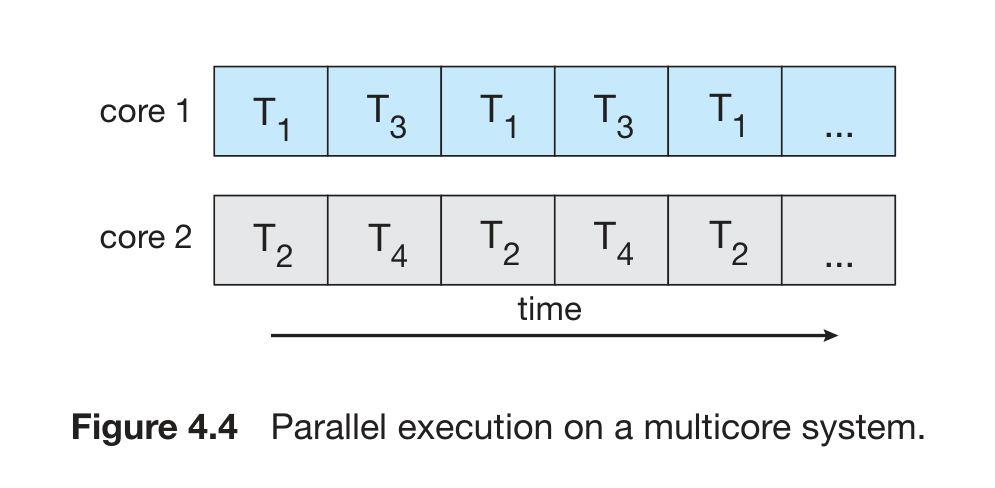《Operating System Concepts》閱讀筆記:p162-p176
《Operating System Concepts》學(xué)習(xí)第 17 天,p162-p176 總結(jié),總計 15 頁。
一、技術(shù)總結(jié)
1.thread
(1)定義
A thread is a basic unit of CPU utilization; it comprises a thread ID, a program counter (PC), a register set, and a stack.
A process control structure that is an execution location. A process with a single thread executes only one task at a time, while a multi-threaded process can execute a task per thread.
2.multicore programming
(1)multicore
Multiple processing cores within the same CPU chip or within a single system.
(2)concurrency vs parallelism
A concurrent system supports more than one task by allowing all the tasks to make progress. In contrast, a parallel system can perform more than one task simultaneously.


(3)multithreading model
Many-to-One Model,One-to-One Model,Many-to-Many Model。
二、英語總結(jié)(生詞:3)
1.empirically
(1)emperical: em-("in") + *per-("to try, to risk") + -al(adjective suffix, "of, like, related to")
adj. pertaining to expericence(以經(jīng)驗為依據(jù)的)。
(2)empirically: empirical + -ly。
(3)示例
Empirically gauging the difference in overhead can be difficult, but in general thread creation consumes less time and memory than process creation(《Operating System Concepts》第 162 頁)。
2.interleave
(1)interleave: inter-("among") + leave("to place")
vt. mix by alternating(使交替,使輪流) between them.
(2)示例
n a system with a single computing core, concurrency merely means that the execution of the threads will be interleaved over time (Figure 4.3), because the processing core is capable of executing only one thread at a time(《Operating System Concepts》第 162 頁)。
3.prominent
(1)prominent: pro-("forward") +minere("project, jut out", mons("mountain"))
adj. prominent litrerally imply sth "stands out, jut out", over time, means "very noticeable, important, or famous(突出的,重要的,著名的)"
(2)示例
Lambda expressions—as well as similar functions known as closures—are a prominent feature of functional programming languages and have been available in several nonfunctional languages as well including Python, C++, and C#(《Operating System Concepts》第 174 頁)。
關(guān)于英語的注解同步更新匯總到 https://github.com/codists/English-In-CS-Books 倉庫。
三、其它
學(xué)習(xí)是一個熟悉、理解、同化的過程。
四、參考資料
1. 編程
(1) Abraham Silberschatz,Peter Baer Galvin,Greg Gagne《Operating System Concepts》:https://book.douban.com/subject/30272539/
2. 英語
(1) Etymology Dictionary:https://www.etymonline.com
(2) Cambridge Dictionary:https://dictionary.cambridge.org

歡迎搜索及關(guān)注:編程人(a_codists)


 浙公網(wǎng)安備 33010602011771號
浙公網(wǎng)安備 33010602011771號